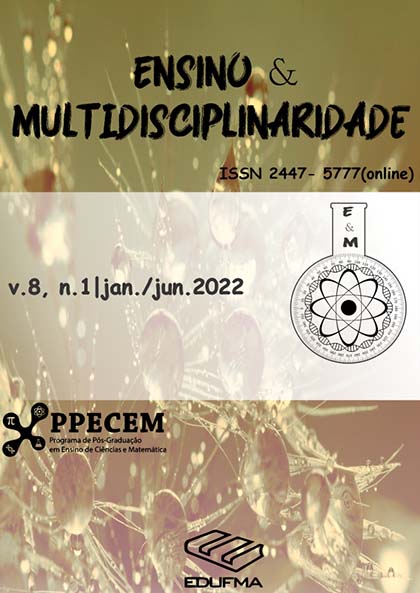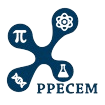Repertório docente para a abordagem histórico-investigativa: um exemplo com o efeito Seebeck
DOI:
https://doi.org/10.18764/2447-5777v8n1.2022.1Palavras-chave:
Ensino de ciências, Abordagem histórico-investigativa, Repertório docente.Resumo
Este artigo teve como objetivos apresentar e discutir a construção do repertório docente por um futuro professor para a utilização da abordagem histórico-investigativa. Para isso, partiu-se do pressuposto de que a abordagem histórico-investigativa apresenta potencialidades para a melhoria do ensino de ciências ao permitir a construção de um ambiente investigativo em sala de aula, ao mesmo tempo em que oferece discussões sobre o processo de aquisição do conhecimento científico em uma perspectiva histórica. Durante a elaboração de seu trabalho de conclusão de curso em Licenciatura em Física, um futuro professor relatou em seu diário apontamentos e reflexões acerca da tentativa de reprodução de um experimento histórico e sua adaptação para uma possível sala de aula. O experimento histórico escolhido foi o correspondente ao efeito Seebeck, para o qual já havia literatura em português para consulta. Analisando seu diário à luz da concepção de reflexão crítica de Brookfield (2017), conseguiu-se identificar os três tipos de assunção no seu processo reflexivo: paradigmático, prescritivo e causal. Concluiu-se que propor e vivenciar um processo investigativo, durante sua formação inicial, auxiliou o futuro professor no desenvolvimento de habilidades e reflexões críticas, esperadas para compor o perfil de um profissional que tenha a intenção de implementar a abordagem histórico-investigativa em sala de aula.
Teaching repertoire to historical-investigative approach: an example with the Seebeck’s effect
This article aimed to present and discuss the construction of the teaching repertoire by a future teacher for the use of the historical-investigative approach. For this, it was assumed that the historical-investigative approach has the potential for improving science teaching, because it allows the construction of an investigative environment in the classroom and offers discussions on the process of historically acquiring scientific knowledge. During the elaboration of his final work for the conclusion of the undergraduate course in Physics, the future teacher reported in his diary notes and reflections about the attempt to reproduce a historical experiment and its adaptation to a possible lesson plan. The historical experiment chosen was the Seebeck’s effect, for which there was already literature for consultation. Analyzing his diary in light of Brookfield’s (2017) conception of critical reflection, it was possible to identify the three types of assumption in his reflective process: paradigmatic, prescriptive, and causal. Thus, it was concluded that proposing and experiencing an investigative process, during the initial training, helped him to develop skills and critical reflections, which is expected to compose the profile of a professional who intends to implement the historicalinvestigative approach in the classroom.
Keywords: Science teaching; Historical-investigative approach; Teaching repertoire.
Downloads
Referências
BATISTA, R. F. M.; SILVA, C. C. A abordagem histórico-investigativa no ensino de Ciências. Estudos Avançados, v. 32, n. 94, p. 97-110, 2018. https://doi.org/10.1590/s0103-40142018.3294.0008
BATISTA, R. F. M.; SILVA, C. C. When things go wrong. Science & Education, v. 28, n. 9, p. 1135-1151, 2019. https://doi.org/10.1007/s11191-019-00071-z
BROOKFIELD, S. D. Becoming a critically reflective teacher. San Francisco: John Wiley & Sons, 2017.
CANEVA, K. L. From galvanism to electrodynamics: the transformation of German physics and its social context. Historical Studies in the Physical Sciences, v. 9, p. 63-159, 1978. https://doi.org/10.2307/27757377
CANEVA, K. L. Physics and naturphilosophie: a reconnaissance. History of Science, v. 35, n. 1, p. 35-106, 1997. https://doi.org/10.1177/007327539703500102
CARVALHO, A. M. P. (Org.). Ensino de ciências por investigação: condições para implementação em sala de aula. São Paulo: Cengage Learning, 2013.
CHANG, H. How historical experiments can improve scientific knowledge and science education: the cases of boiling water and electrochemistry. Science & Education, v. 20, p. 317-341, 2011. https://doi.org/10.1007/s11191-010-9301-8
FERREIRA, É. J. B.; SILVA, A. P. B. Termomagnetismo ou termoeletricidade? Um estudo do trabalho de Thomas Johan Seebeck. Caderno Brasileiro de Ensino de Física, v. 33, n. 3, p. 861-878, 2016. https://doi.org/10.5007/2175-7941.2016v33n3p861
HEERING, P.; HÖTTECKE, D. Historical-investigative approaches in science teaching. In: MATTHEWS, M. R. (Org.).International handbook of research in history, philosophy and science teaching. Dordrecht: Springer, 2014. p. 1473-1502. https://doi.org/10.1007/978-94-007-7654-8_46
HÖTTECKE, D.; SILVA, C. C. Why implementing history and philosophy in school science education is a challenge: an analysis of obstacles. Science & Education, v. 20, p. 293-316, 2011. https://doi.org/10.1007/s11191-010-9285-4
JARDIM, W. T.; GUERRA, A. Experimentos históricos e o ensino de física: agregando reflexões a partir da revisão bibliográfica da área e da história cultural da ciência. Investigações em Ensino de Ciências, v. 22, n. 3, p. 244-263, 2017. http://doi.org/10.22600/1518-8795.ienci2017v22n3p244
PESTRE, D. La pratique de reconstitution des experiences historiques, une toute première réflexion. In: BLONDEL, C.; DÖRRIES, M. (Org.). Restaging Coulomb: usages, controverses et réplications autor de la balance de torsion. Firenze: Leo S Olschki, 1994. p. 17-30.
PETERS, E. Reforming cookbook labs. Science Scope, v. 29, n. 3, p. 16-21, 2005.
PINTO, J. A. F.; SILVA, A. P. B.; FERREIRA, É. J. B. Laboratório desafiador e história da ciência: um relato de experiência com o experimento de Oersted. Caderno Brasileiro de Ensino de Física, v. 34, n. 1, p. 176-196, 2017. https://doi. org/10.5007/2175-7941.2017v34n1p176
SEEBECK, T. J. Über den magnetismus der galvanischen kette. In: SEEBECK, T. J. (Org.). Abhadlungen der physikalischen Klasse der KöniglischPreußsischen. Berlim: Akademie der Wissenschaftten aus den Jahren 1820-1821, 1822. p. 289-346.
SEEBECK, T. J. Magnetische polarisation der metalle und erze durch temperatur-differenz. In: SEEBECK, T. J. (Org.). Abhadlungen der physikalischen Klasse der Königlisch-Preußsischen. Berlim: Akademie der Wissenschaftten aus den Jahren 1822-1823, 1825. p. 265-373.
SEEBECK, T. J. Magnetische polarisation der metalle und erze durch temperatur-differenz (1822-1823). In: Ostwald’s Klassiker der Exakten Wissenschaften. Leipzig: Wilhelm Engelmann, 1895. No. 70.
SILVA, A. P. B. Distorções científicas perenes e suas consequências para o ensino de ciências: a relação entre eletricidade, magnetismo e calor. Revista Brasileira de Ensino de Física, v. 41, n. 4, e20180311, 2019a. https://doi.org/10.1590/1806-9126-RBEF-2018-0311
SILVA, A. P. B. Magnetismo e condução de calor no trabalho de Seebeck: desafios da ciência experimental. In: SILVA, A. P. B.; MOURA, B. A. (Org.). Objetivos humanísticos, conteúdos científicos: contribuições da história e da filosofia da ciência para o ensino de ciências. Campina Grande: EDUEPB, 2019b. v. 1. p. 53-88. http://doi.org/10.7476/9786586221664
SILVA, A. P. B.; SILVA, J. A. A influência da naturphilosophie nas ciências do século XIX: eletromagnetismo e energia. História, Ciências, Saúde-Manguinhos, v. 24, n. 3, p. 687-705, 2017. https://doi.org/10.1590/S0104-59702017000300008
VICENTE, S. A.; PINTO, J. A. F.; SILVA, A. P. B. História da ciência, experimentação e vídeos: introdução ao conteúdo de circuitos elétricos. Revista Encitec, v. 10, n. 2, p. 151-165, 2020. http://doi.org/10.31512/encitec.v10i2.2722
ZABALA, A. A prática educativa: como ensinar. Porto Alegre: Penso, 2015.
Downloads
Publicado
Como Citar
Edição
Seção
Licença
Copyright (c) 2022 Ensino & Multidisciplinaridade

Este trabalho está licenciado sob uma licença Creative Commons Attribution 4.0 International License.
Autores que publicam nesta revista concordam com os seguintes termos:
a. Autores mantém os direitos autorais e concedem à revista o direito de primeira publicação, com o trabalho simultaneamente licenciado sob a Licença Creative Commons CC BY que permite o compartilhamento do trabalho com reconhecimento da autoria e publicação inicial nesta revista.
b. Autores têm autorização para assumir contratos adicionais separadamente, para distribuição não-exclusiva da versão do trabalho publicada nesta revista (ex.: publicar em repositório institucional ou como capítulo de livro), com reconhecimento de autoria e publicação inicial nesta revista.
c. Autores têm permissão e são estimulados a publicar e distribuir seu trabalho online (ex.: em repositórios institucionais ou na sua página pessoal) após a publicação final do manuscrito.



















